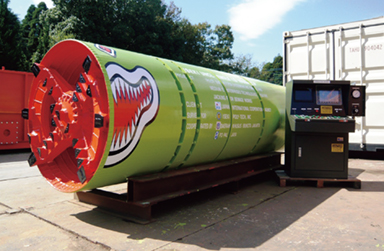ODA Topics 6
Support for Japanese Small and Medium-sized Enterprises (SMEs) Overseas Business Development Using ODA
In Japan, small and medium-sized enterprises (SMEs) account for 99.7% of all the companies there, and roughly 70% of workers are employed at SMEs. While SMEs include a variety of types of companies, from long-established companies to venture companies tackling new business, many of them possess reliable technology and know-how as well as experience, human resources, products and services. Therefore, they have potential to be able to solve development issues in developing countries. “Support for Japanese Small and Medium-sized Enterprises (SMEs) Overseas Business Development Using ODA” is a program that aims to contribute to solving these issues by utilizing the technology and products of Japanese SMEs, while providing support to them to expand their business overseas.
However, for SMEs that generally have little experience in business overseas, entering foreign markets can be highly challenging. In particular, there are some risks when SMEs enter into the markets of developing countries with different history, culture, and level of economic development. For them, there seems to be a lot of information to be confirmed and challenges to overcome, such as whether their products and technologies can be helpful for developing countries or whether there are sufficient needs in the market and have to link their business with existing needs in the market. Given these challenges, the JICA's “Support for Japanese SMEs Overseas Business Development Using ODA” program allows companies to plan and submit proposals under their own ingenuity regarding the ways of utilizing their products and services. The companies are adopted through proposal competition. Selected companies are obliged to investigate the local market and verify the applicability of their product to the country as a JICA-commissioned survey. When selected companies investigate market research, The Japanese Embassy and JICA's overseas office of each country support these companies based on their mutual trust with local parties, such as local government officials.

Traffic congestion information delivering system (Photo: ZERO-SUM LTD.)
This program has already been conducted for five years since it began in 2012. To date, over 600 companies have used the program, producing positive examples both in terms of contributing to solving development issues and overseas business expansion. For example, a technology of a construction equipment manufacturer located in Tokyo, which constructs sewerage system through a non-open-cut pipe jacking method that does not cause traffic congestion during construction, was highly regarded and adopted as a public works project in Indonesia. Additionally, an IT company in Kyoto developed a system for delivering information on traffic congestion for India using mobile communications and cloud computing, resulting in a 30-year contract to provide the said service. Also, a company in Tottori prefecture that develops, manufactures, and sells glass foam materials worked to spread water-conserving agricultural methods in Morocco by using soil improvement material made from waste glass. This project was successful in reducing water consumption by half and increasing the yield of tomato crop by 30%. These various cases are examples of win-win relationships between Japanese SMEs and developing countries in a variety of fields and countries.
The benefits of this program for SME are not only limited to their overseas business, such as securing new business partner/clients, or the provision of local production/services. Rather, it has a wide range of benefits. As the company's vision extends to overseas markets, it exerts positive influence on employee awareness, human resource development, and leads to greater recognition of the company, their own products and services as well as revitalization of the local economy where these SMEs are located.

Excavator (Photo: Iseki Poly-Tech, Inc.)
The Ministry of Foreign Affairs and JICA continue to support the overseas expansion of Japanese SMEs utilizing ODA as a “catalyst” to connect the SMEs with developing countries while working to solve the development issues in developing countries.
